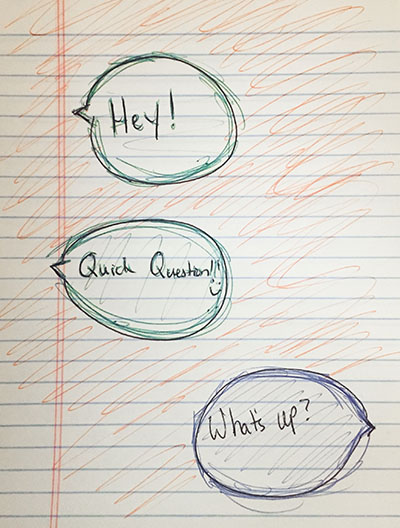Real-time Chat is Good for Work in Small Doses

Group chat tools are popping up everywhere. Real-time communication is now, it's instant, and it's everywhere. In the past there was IRC, Campfire, and Hipchat. Now, Slack is all the rage. It seems like everyone is using it these days. Slack is supposed to keep you in contact with your remote and in-office employees. It's supposed to bring you together and make you more productive. The tagline on their website is "Be Less Busy." It's supposed to make you less busy, however, that's only true in small doses and certain situations. Using Slack as your only tool for communication and productivity may make you busier.

Near the end of last year, I wrote about How to use Slack Without Distracting your Coworkers. There are a number of things that can be beneficial as well as distracting when using a real-time chat application as your company's primary communication tool. Some of the pros of using Slack or other real-time communication tools include:
- Staying in touch with your team.
- Knowing who is available to chat right now (there's also a con, see #8 in the cons list).
- Emergencies. The fast and instant ability to share and receive important alerts such as new sales, important customers signing up, things breaking, and emergencies. (We've got a few automatic messages that ping us in Slack if something breaks in production).
- Instant file sharing. Slack in particular makes it easy to quickly share files and links if you need it now. It's not the best for looking up older files or for organization of these files – "Hey, can you send me that thing again?" – but it's great for quickly sharing something if you need it now[^1] and can't look for it yourself (if you can look it up yourself, then you should use something like dropbox – it's better for file sharing and organization).
- Awesome for real-time events like launching a product, attending conference, or managing real-time customer support. When we launch a new product, we receive real-time updates if something succeeds, breaks, or needs our attention. It's very useful for launching new products and going live with new events!
- Makes for a good water cooler. Slack and other chat application allow you to have a place to hang out and feel like you're in an office because it's a central place where everyone shows up. It gives you a sense of belonging and for that reason he can be beneficial to use In an organization.
I enjoy using Slack and have enjoyed using other chat apps in the past such as IRC and Hipchat. Over the years I've noticed a few cultural byproducts that occur when using real-time chat apps. Some can be harmful to the productivity, efficiency, and ultimately the happiness of all employees in an organization. With great power comes great responsibility. While I like real-time messaging, there are a fair share of cons, especially when using it as your primary method of communication:
- Real time chat is a slippery slope that encourages people to always be paying attention and to reply at an instant. I wrote about this back in October of last year.
The first issue with realtime communication? It is distracting. In slack, when you receive a private message or someone "at-messages" you (@matt: hey), a noise and a notification alert you pulling your focus away from whatever it was that you were doing to it. It's equivalent to someone waking into your office while you're deep in thought and yelling, "HEY MATT, I'VE GOT A QUESTION!" It's hard to get right back into the flow of things after changing your thought process. It's easier than ever to "walk up and tap someone on the shoulder" with Slack and that can be very distracting.
-
Immediate and urgency leads to burnout. Not everything needs to be immediate and urgent. Real-time chat applications encourage this if you use them as your primary tool for communication. Even if you don't intend for something to be urgent, someone may receive it as urgent, otherwise id would be communicated through different means.
-
Broken thoughts. Thoughts are broken down into a few words at a time, followed by a return. Then another. Another. Something else. Get the point? It pulls the focus of people away from what they are doing. Everyone is busy, it's not a unique attribute of an employee in an organization. Constant interruptions slow down the locomotive and harm productivity. Have you ever watched a train get going? It takes time uninterrupted time, just like doing work.

-
Real time chat encourages a "right now" culture. It's like everyone is constantly switching focus and that causes stress. We have a distributed team in a variety of timezones. Where it's 9am for me, it can be noon or 10pm for someone else. Asking someone to do something right now, or expecting that they are available right now (they may be at lunch or sleeping). And despite being inconsiderate, it happens more often than you expect. And more than half of the time, despite feeling like something is for right now, it's usually not and can make people feel like they're burning out.
-
Disorganized thoughts. Channels and topics differ. Channels scroll infinitely while topics get lost in the mix. We've tried creating different channels for each topic, but ultimately the discussion traverses to another topic in the same channel making it very difficult to find something specific.
-
It's tiring to pay attention to what's going on all the time. Either you have the chat app setup on a separate screen and constantly look back and forth, or it's open to the side of what you're doing. You feel like you need to keep checking it or you'll miss out on something (FOMO). If you're always paying attention to what's going on, when do you have time to work?
-
Real-time communication inspires fast poorly thought out messages whereas other forms of communication allow you to take your time because you will be cool, calm and collected. With other forms of communication: you don't feel like you have to reply immediately. That prevents you from being distracted from your current work. In other words: real-time chat apps pull you away from your focus. Without them you're able to remain focused on what you're doing. This provides better responses more well thought out and waste less time.
-
Being "Online"
Presence, assumptions, and expectations. Many chat platforms put a little green dot next to people telling you they are online/available. That’s called presence, and it’s worse than you might expect. It’s professional pressure to stay logged into chat. It’s saying “if you aren’t green, you aren’t at work”. Quitting chat suggests you aren’t part of the group. And that pressure forces you to keep a chat room open all day. Which forces you to absorb the blows of all-day distractions while you’re trying to actually get the work done you’re supposed to be doing. It’s just a modern version of the outdated butts in seats. Sure you can say do not disturb, but the true version of do not disturb is quitting the app.
Via Jason Fried at Signal v Noise
It's always beneficial to have quiet uninterrupted time when working or being creative. Nothing is more distracting than someone tapping you on the shoulder or a notification from a real-time chat application popping up taking your focus away from your work. If you ask almost anyone, distraction is the ultimate devil of productivity.
At Sidestep we've been using Slack as our primary communication tool for as long as I can remember and we're starting to experiment with other tools for communication. We've found forum software (discourse) to be handy in relieving the pain points (above). For the urgent it needs to happen right now!!! type of things, Slack is great, but not everything is urgent (if it is, might be worth a rethink of the strategy). I hope it also allows us to work smarter and happier.
It's amazing that we've accepted these interruptions for so long. It has become so ingrained into our days that we didn't think that work could be different. Imagine receiving a phone call every 10-30 minutes with a quick question or an update on something. Wouldn't that be very distracting? Real-time chat isn't much different. Sure it's not voice, but it has the same characteristics:
- You can reach out to one or many people
- It sends you a notification
- You feel the urgency to "answer" it immediately.
- It pulls your focus away
- It comes to you on your cell phone or computer
Why don't we treat real-time chat similarly to how we go to meetings? We join the meeting, then we leave when it's over. This may inspire communications to be more focused and productive (and waste less time, too!)
Real-time chat has it's place and is a very useful tool in an organization so as long as it's not your only tool. It's great in lieu of picking up the phone, when launching a product to keep everyone informed, or hosting an event. For everything else: there are plenty of alternatives.
We like using real-time chat for certain scenarios. For us it's not great for everything and can contribute to stress, burnout and unhappiness when used for everything. Keep that in mind, it may be good if you're a manager, but it may not be when you're the one on the other end of the wire. What may be good for you may not be good for everyone else. Keep that in mind :)
This post was partially inspired by Jason Fried's article, Is group chat making you sweat? – you should read that, too.
Update (7/15/2016): I've found a bunch of other articles that share similar feelings. They are all great:
Dave, I feel like you’ve been much more angry as of late. Is there something else going on? Some stress that none of us are seeing?
I’m finding that “always on” tendency to be a self-perpetuating feedback loop: the more everyone’s hanging out, the more conversations take place. The more conversations, the more everyone’s expected to participate. Lather, rinse, repeat.
People are talking, and if I’m not around to show my presence, it would mean I’m not working. But what was actually getting done, I wasn’t so clear about.
When there's an unspoken, implicit expectation that we'll be on Slack all day long, we begin to measure our personal productivity in terms of our response to chatter instead of in terms of the completion of our most critical tasks. We lose control of our time and what was once creative, intentional work turns into a constant stream of opinions, anecdotes, and noise.
It’s easy to see where the complaints stem from. On average, a worker checks his work email 3.2 hours every day. How long is a user plugged into Slack on a workday? An astonishing 10 hours.
Slack’s greatest challenge may be people’s own habits. To some, its endless stream of chatter may be worse even than e-mail, because the barriers to commenting rapidly are lower.

Member discussion